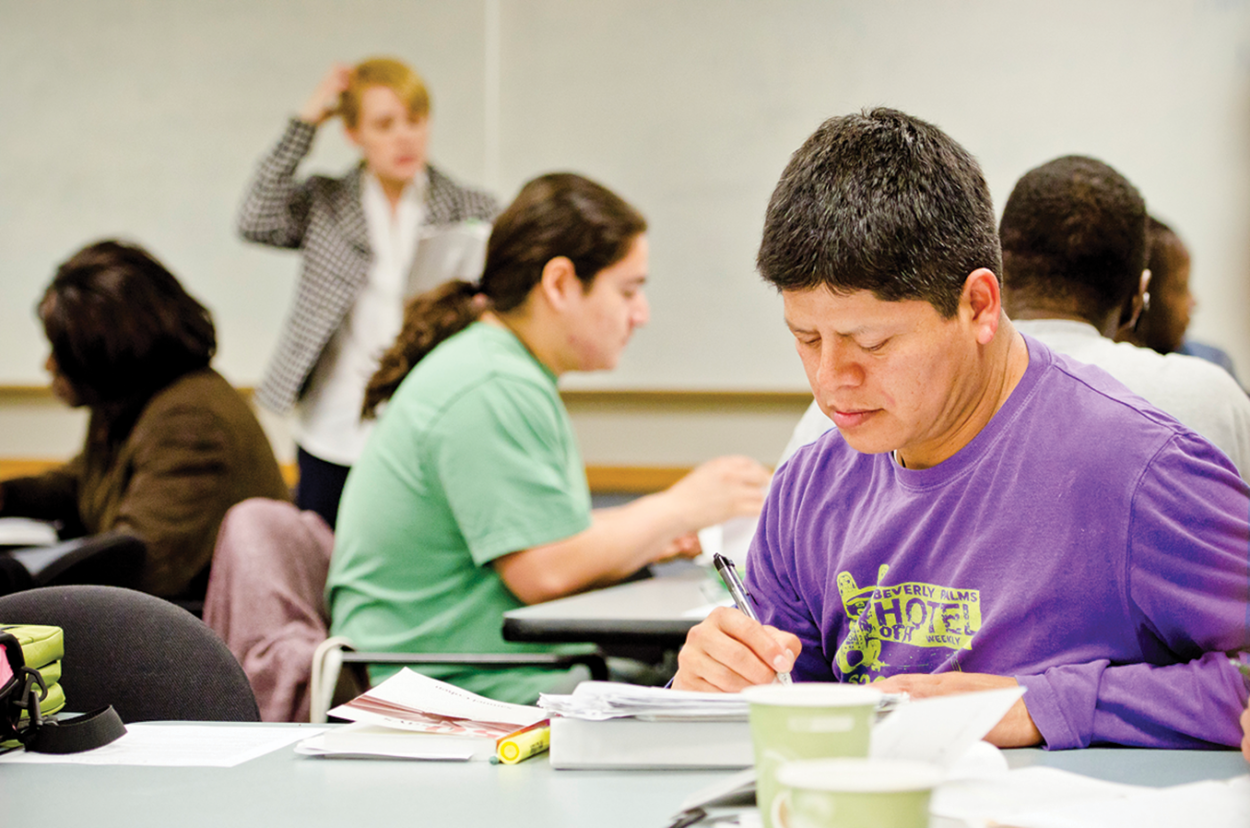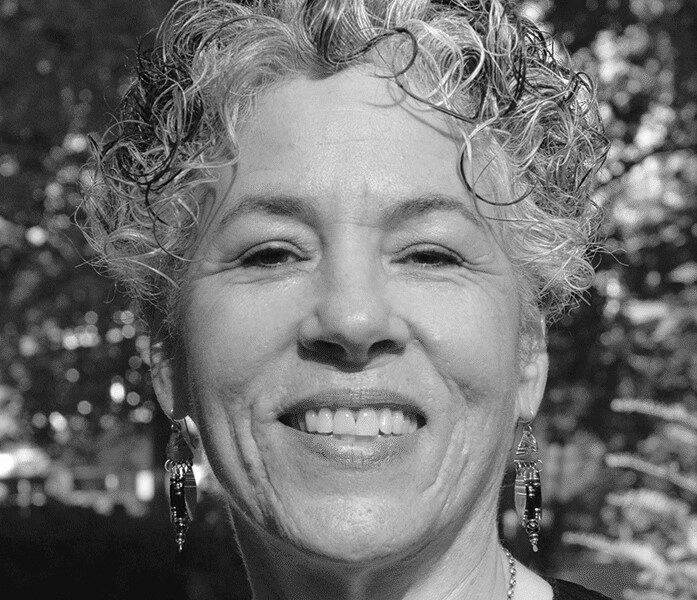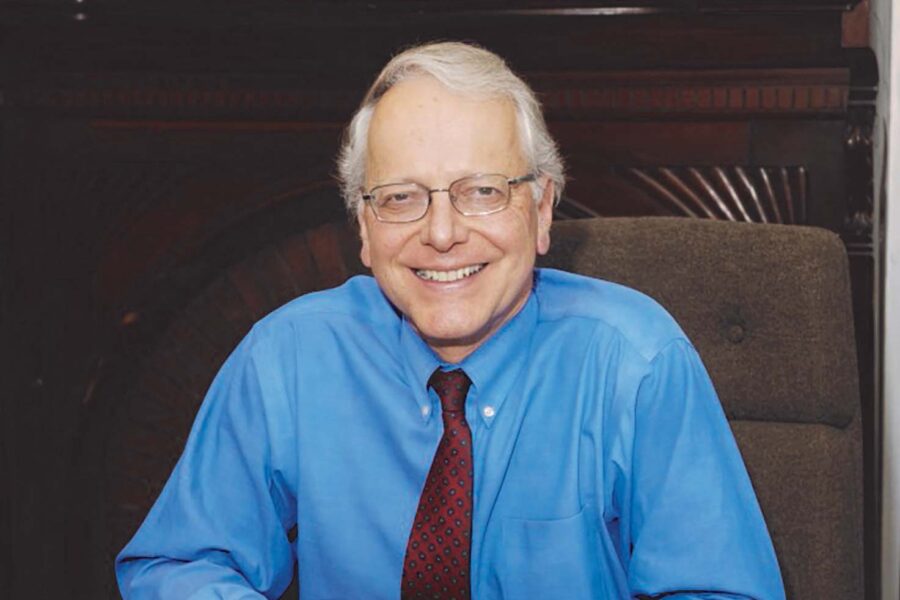Since opening its doors 169 years ago, Antioch has been committed to the idea that the act of exploring knowledge in a nurturing space with a like-minded community has the power to change lives. But for so many people, and for so many reasons, the opportunity to study in college classrooms can seem like little more than a dream.
Trying to close this gap are two inspiring Antioch programs: the Clemente Veterans Initiative at Antioch Seattle and the Bridge Program at Antioch Los Angeles. Both programs have long been directed at students who, for whatever reason—maybe they never graduated from high school, or they doubt their writing skills, or they spent their twenties serving in uniform, or they simply haven’t set foot in a classroom for decades—are not ready yet to go back to finish their undergraduate degree. They help those students navigate the challenges of adult learning, build study skills, and ultimately transfer into a college-level degree program. And they also engage students in the life of the mind and the joy of studying the humanities: literature, philosophy, history, art, religion, and the rest of the liberal arts. In doing so, they demonstrate the power of the humanities to inspire, support, and encourage individual and collective growth.
Perhaps most remarkable: both programs carry out their missions at no cost to students. Their results showcase the truth that these experiences should be available to all.
Reaching Veterans With A Proven, Effective Lifeline:
the Humanities
Over thousands of years, the study of works by philosophers such as Plato and Aristotle, along with other great works of literature and art has been a powerful tool for healing and self-discovery. And today, too, the humanities are a catalyst that brings students together. That’s the thinking that undergirds the Clemente Veterans Initiative (CVI).
CVI is an instance of the Clemente Course in the Humanities, a curriculum and nonprofit founded by Earl Shorris in 1996. Since its launch in 2016, Antioch Seattle’s course has been geared towards veterans and those with military backgrounds and experience, as well as their spouses and dependents. For its participants, it provides access to higher education. Edward Durgan, the Academic Director of the program, explains that CVI is a keystone to recovery and has proven to save lives.
“When 30% of the homeless population are veterans, and 22 veterans a day commit suicide, this is an effective program for veterans to make progress in their lives and move through trauma towards recovery,” Durgan says.
CVI provides a safe, nurturing space for veterans. The students’ shared military experience is often what draws many seeking camaraderie and support. Durgan says, “They enjoy being in a community of other veterans, so they’ll show up, just to hang out with other veterans and talk about something interesting and talk about their experiences.” This shared experience is the foundation that allows students to connect and bond.
Delving into the canon then becomes the spark for students to see their experiences represented in the works read in class. Durgan says, “The accounts written by Homer in The Odyssey and The Iliad resonate with veterans’ immediate and current experiences.” Students see themselves represented in the texts, an experience of representation that pulls students into deeper thought and study.
Providing a Bridge to College
Bridge students often have shared experiences, too. Despite coming from a broader variety of backgrounds and circumstances, most Bridge students are united both in having limited financial resources and in wanting something more but not necessarily knowing what to do to move forward. Bridge offers a pathway to a better life through study of the humanities.
The Bridge program was founded in 1999 by David Tripp and Shari Foos ’94, ’97 (Antioch Los Angeles, BA; MA in Clinical Psychology), also from the template of the Clemente Course in the Humanities. Bridge is constructed as a nine-month program comprised of interdisciplinary courses in Art History, Literature, Philosophy, and the Writing Arts. The goal of Bridge is to empower students—the poor, working poor, and those overwhelmed by life’s challenges—to develop critical thinking skills while claiming their own voice as they come to participate more fully in public life. Tuition, books, supplies, child care, and transportation are provided at no charge to students.
Like the program it’s partly based on, Bridge offers a supportive environment where students are
equipped with the tools they need to give back to their communities, thereby inspiring, empowering, and reaching back for others.
Russell Thornhill ’13 (Antioch Los Angeles, BA), the Co-Director of Bridge along with Kathryn Pope ’20 (Antioch Los Angeles, MA in Urban Sustainability), explains that Bridge works partly by exposing participants to diversity. “Students get to meet people from all walks of life, from throughout the community, with different life experiences.” Students expand on this work in the classroom as “their instructors take them around the world as they talk about art history and philosophy.”
The results are transformative for many. Says Thornhill, “I’ve seen them go from this narrow perspective to a much broader perspective on their life’s journey.”
Engaging with the texts promotes critical thinking. Students examine themselves and seek ways to apply the texts to their own lives. “It’s really about how they’re having conversations about the humanities,” Thornhill adds. “We’re talking about human life, human existence. How do I interact in these various areas? How do I engage art? What does art have to say to me today?”
Shared Sacred Spaces of Empowerment
Across these two programs, the act of self-inquiry consistently serves as a tool for self-growth and development. And students see this growth not only in themselves but also in each other. These shared victories and mutual support fuel growth and development.
In the Clemente Veterans Initiative, this camaraderie and mutual aid is especially powerful because the participants often share similar histories of trauma—the trauma of fighting in wars. Instructors empower students to tell their stories, and this act of telling can be therapeutic, unlocking self-discovery and self-agency.
As students speak of personal experiences they might never have shared before, they discover the power of their own voices. “We read war poetry together and then write poetry together,” Durgan says. “And for one of my students, that’s what cracked it open for him. He was able to write a poem about his most traumatic experience in Vietnam, and that was the first time he put it down in words.”
Unique to CVI Seattle is the course in “War, Combat, and Military Experience Memoir Writing” that serves as a conclusion to the three-quarter trauma-informed curriculum. The freedom of poetic verse prepares students to create coherent and compelling narratives of their experiences. Students bear witness to each other’s testimonies. This both validates the student who is sharing while at the same time reassuring the students listening that they are not alone. Support and camaraderie are at the core of every session.
The Inspirational Impact of Student Success
The teams running the Clemente Veterans Initiative and the Bridge Program take special inspiration in seeing their students grow, take the tools they’ve learned, and become change-makers. Thornhill says watching Bridge alumni thrive in the world “is transformative for me because it tells me the possibilities of the human being, the human spirit. The person that has the desire, the person that seizes an opportunity—it’s not given to them, but it makes a difference in their life.”
Similarly, Durgan finds inspiration in the therapeutic growth he’s seen in his students. “That is the power of the humanities,”he says. “When it’s done right, it leads to kind of a discovery of the self—a discovery of one’s own freedom, creativity, uniqueness,
and agency.”
Please visit at.antioch.edu/bridge-program and at.antioch.edu/clemente-program for more info.



